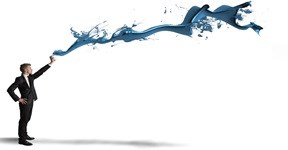I saw an interesting video the other day. The always controversial Larry Ellison, founder of Oracle and third richest man in America, spoke candidly recently about Oracle's troubled relationship with Google, his support for the NSA, and the future of Apple.
To sum up: Google is evil, the NSA is doing stand-up work, and Apple is going to tank - an interesting interview by all accounts.

© alphaspirit - Fotolia.com
Loss of a creator
The reason cited for Apple's impending doom was the loss of its creator, Steve Jobs, with whom he is said to have been very dear friends with.
Larry Ellison pointed out Jobs' brilliance and ingenuity by saying that he was "our Edison, he was our Picasso." His comparison of Steve Jobs, one of our generation's most lauded entrepreneurs, to Picasso, arguably modern history's most notable artist, raises many interesting points. As well as a curious question.
Can an entrepreneur be called an artist?
This seems an incongruous association at first glance. One might struggle to swallow the idea that an entrepreneur's creation, generally a product for consumption (and possibly a brand), would then by implication be a "work of art".
After all, it's hard to imagine a consumer product exhibiting duende. Duende is the capacity art sometimes has to deeply move the beholder - perhaps accompanied by chills down your spine. It's hard to imagine the latest iPhone moving a user to tears (of course this is a matter of opinion).
Allow me to explain. There's a similarity in what artists and entrepreneurs do, which is essentially to create something new, or recreate something in a new way.
Artefacts
Let me approach the question in a different way. What common ground, on the most fundamental level, can we refer to when we talk about artworks and products? In both cases they're artefacts.
An artefact is a human-made object that serves a purpose. An artefact isn't only a physical object, but essentially any human-made creation.
The use here of the term artefact strips away the connotations (those distorters of meaning), which accompanies value-laden words like "art" and "product". This gives us a neutral ground to work from without unnecessary semantic baggage. So if both art and product are artefacts, then why is one called art and the other a product?
Essentially what I'm asking here, is what makes art, "art", and how is this different to a "product". To answer this, let's turn to the second part of our definition of artefact, which is that it serves a purpose. Product and art might then be distinguished by their reasons for being.
We won't do something as presumptuous as try define the purpose of art (as that debate will continue indefinitely). But it's within the scope of reason to say we typically think of art as having loftier goals than consumption and profit: transcended calling, world transformation, the deepened understanding of the human condition, etc.
A product, on the other hand, is associated with material aims: fulfilling a consumer's need to generate profit for its producer. So then, are the entrepreneur and artist shown to be creators of fundamentally different artefacts after all? In which case then, an entrepreneur is in no way an artist.
But the flaw in this logic soon becomes apparent. How often can a so-called piece of art itself be a packaged good of cultural consumption? In other words a product designed and marketed to make entertainment industry professionals somewhere a lot of money to, as Sinead O'Conner puts it, pay off their yachts in Antigua. (The Oatmeal recently made a hilarious comic, How to Refurbish a Pop Star, depicting the marketing strategy behind pop stars' performances.)
Turning business into art
Alternatively, it is often the case that a business product can be more than a vehicle for profit. (Let's at least hope so for the human race.) An entrepreneur's product can also fulfil the aims we think art must: provoking thought and recreating systems. Think about how Facebook is making us seriously re-evaluate what privacy means to us, while also redefining what privacy is.
So what we find is that art in the traditional sense of the word can be little more than a consumable good, while the product of an entrepreneur can have a wider impact than simply generating profit. So I'd love to see more artists in business school and more business people engaged in activities that exercise their creativity.
You don't need to be a musician or painter to strive for creativity in your work. And if you are an artist in the classic sense of the word, this doesn't mean you won't benefit from some entrepreneurial spirit.
This isn't only a speculative address of the nature of the entrepreneur, or even of what it means to be an artist today, though both are worthy ideas to explore.
The question perhaps I'm foremost posing is, how can we understand products and the brand behind them, in the wider context of their legacy in the unfolding of history and the shaping of reality?







































